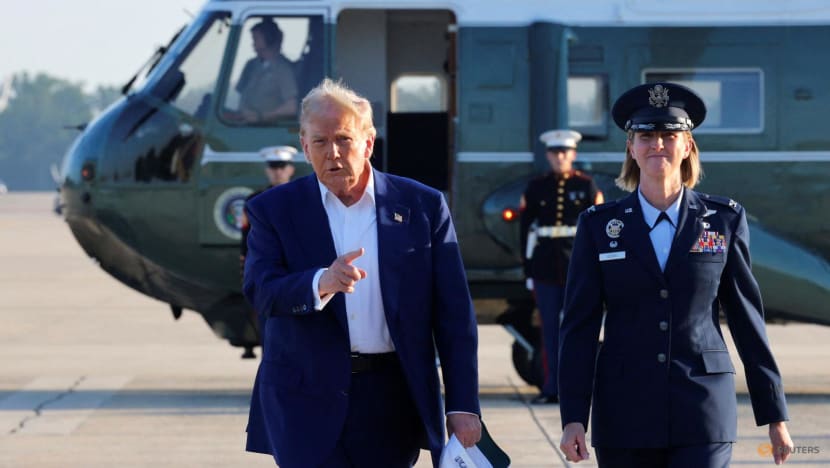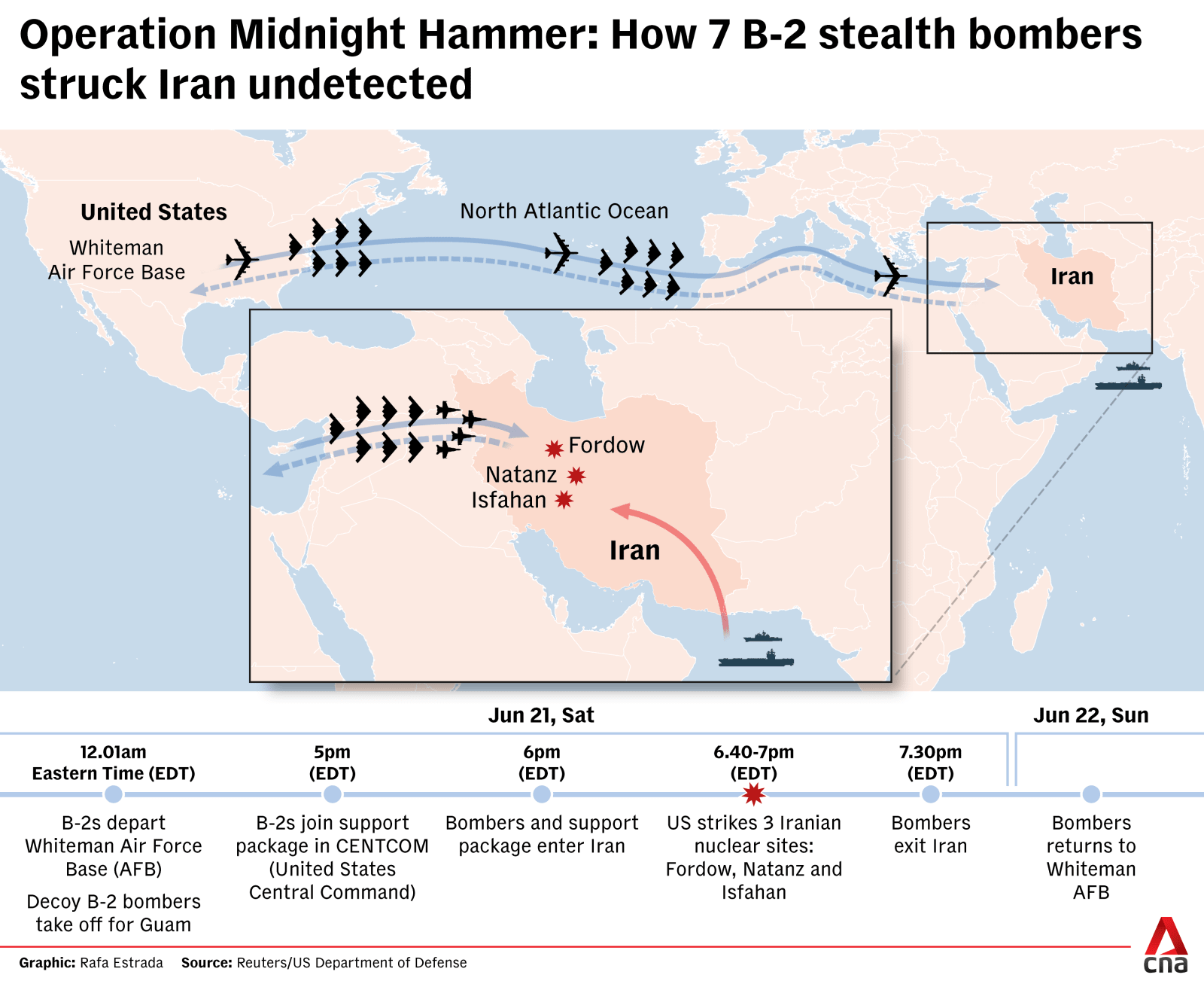'Not happy': Trump accuses Israel, Iran of breaching truce

US President Donald Trump walks with Air Force Commander Colonel Angela Ochoa after stepping off Marine One to board Air Force One to depart for the NATO summit in The Hague, Netherlands, at Joint Base Andrews, Maryland, US, on Jun 24, 2025. (Photo: Reuters/Brian Snyder)
US President Donald Trump accused both Israel and Iran of violating a ceasefire on Tuesday (Jun 24), hours after he announced it, expressing particular frustration with Israel which had announced plans for major new strikes on Tehran.
Speaking to reporters before leaving for the NATO summit in The Hague, Trump said Israel "unloaded" right after agreeing to the deal.
"In all fairness, Israel unloaded a lot, and now I hear Israel just went out because they felt it was violated by one rocket that didn't land anywhere. That's not what we want," he said.
Trump said he was not happy with Iran, "but really unhappy with Israel".
"Israel, do not drop those bombs," he said. "If you do it is a major violation. Bring your pilots home, now."
He added that Israel had to calm down.
"I gotta get Israel to calm down now," Trump said as he left the White House.
"Israel, as soon as we made the deal, they came out and they dropped a load of bombs, the likes of which I've never seen before, the biggest load that we've seen."
"We basically have two countries that have been fighting so long and so hard that they don't know what the f*** they're doing."
CEASEFIRE?
Israeli Defence Minister Israel Katz earlier said he had ordered the military to strike Tehran in response to what he said were missiles fired by Iran in a violation of the ceasefire announced hours earlier by Trump.
The minister said in a statement he had ordered the military to "continue high-intensity operations targeting regime assets and terror infrastructure in Tehran" in light of "Iran’s blatant violation of the ceasefire declared by the President of the US".
Iran denied violating the ceasefire and said Israel's attacks had continued for an hour and a half beyond the time the ceasefire was meant to start.
The armed forces general staff denied that there had been any launch of missiles towards Israel in recent hours, Iran's Nour News reported.
Both Israel and Iran had confirmed the ceasefire after Trump's announcement.
Israeli Prime Minister Benjamin Netanyahu said his country had achieved the goals it set in launching its Jun 13 surprise attack on Iran - to destroy its nuclear programme and missile capabilities.
"Israel thanks President Trump and the US for their support in defence and their participation in eliminating the Iranian nuclear threat," Netanyahu had said.
Iran's top security body, the Supreme National Security Council, said its military had forced Israel to "unilaterally accept defeat and accept a ceasefire".
Iran's forces would "keep their hands on the trigger" to respond to "any act of aggression by the enemy", it said.
Iran's Foreign Minister Abbas Araqchi had said that Iran would halt its retaliatory strikes provided that Israel stopped attacking as of 4am in Tehran.
In the last reported strikes before the ceasefire, missiles killed four people in the southern Israeli city of Beersheba, the Israeli ambulance service said.
Iranian officials said nine people, including a nuclear scientist, were killed in a strike on a residential building in northern Iran.
GLOBAL RELIEF
Despite the early threats to the ceasefire, the response across the region and wider world was largely one of relief at the prospect of an end to the biggest direct confrontation ever between the two foes.
Global stock markets surged and oil prices tumbled after the ceasefire announcement, in the hope it heralded a resolution of the war two days after the US hit Iranian nuclear sites with huge bunker-busting bombs.
"We’re happy, very happy. Who mediated or how it happened doesn’t matter. The war is over. It never should have started in the first place," said Reza Sharifi, 38, heading back to Tehran from Rasht on the Caspian Sea, where he had relocated with his family to escape strikes on the capital.
"I was so worried that Iran would end up like Syria or Iraq," said Maryam, 41, who stayed in Tehran because her family had no money to travel.
"I want my two children to grow up in peace. I want them to live their childhood happily."
Israel attacked on Jun 13, hitting Iranian nuclear sites and killing the top echelon of its military command in the worst threat faced by the Islamic Republic since war with Iraq in the 1980s.
During the campaign, Israel said it was prepared to topple Iran's clerical rulers if necessary to achieve its aims and struck symbolic targets unrelated to the military, culminating on Monday with a strike on Tehran's Evin prison.
Iranian officials say hundreds of people have been killed in airstrikes. Full information about the extent of the damage cannot be confirmed independently, with media tightly controlled.
Iran's retaliatory missile strikes killed 28 people in Israel, the first time large numbers of Iranian missiles have penetrated its defences.
Trump entered the war on Saturday with strikes on Iranian nuclear sites buried under a mountain using huge bombs that Israel does not possess.

A senior White House official said Trump had brokered the ceasefire deal in a call with Netanyahu, and Israel had agreed so long as Iran did not launch further attacks.
"On the assumption that everything works as it should, which it will, I would like to congratulate both Countries, Israel and Iran, on having the Stamina, Courage, and Intelligence to end, what should be called, 'THE 12 DAY WAR'," Trump wrote on Truth Social.
Qatar's Prime Minister Sheikh Mohammed bin Abdulrahman Al Thani secured Tehran's agreement during a call with Iranian officials, an official briefed on the negotiations told Reuters.
US Vice President JD Vance, Secretary of State Marco Rubio and US special envoy Steve Witkoff were in direct and indirect contact with the Iranians, a White House official said.
Iran had responded to the US participation in the airstrikes by firing missiles on Monday at the biggest U.S. military base in the Middle East, located in Qatar.
No one was hurt in that strike, with Iran's retaliation apparently calibrated to allow de-escalation afterwards.
Trump thanked Tehran for warning the US in advance to avoid injuries, and called the strike "a very weak response, which we expected, and have very effectively countered".
The US had been negotiating with Iran to agree curbs to its nuclear programme, after Trump quit a previous agreement in 2018. Iran has always said its nuclear programme is peaceful.
"Now Iran is incapable of building a nuclear weapon with the equipment they have, because we destroyed it," Vance said in an interview on Fox News.














